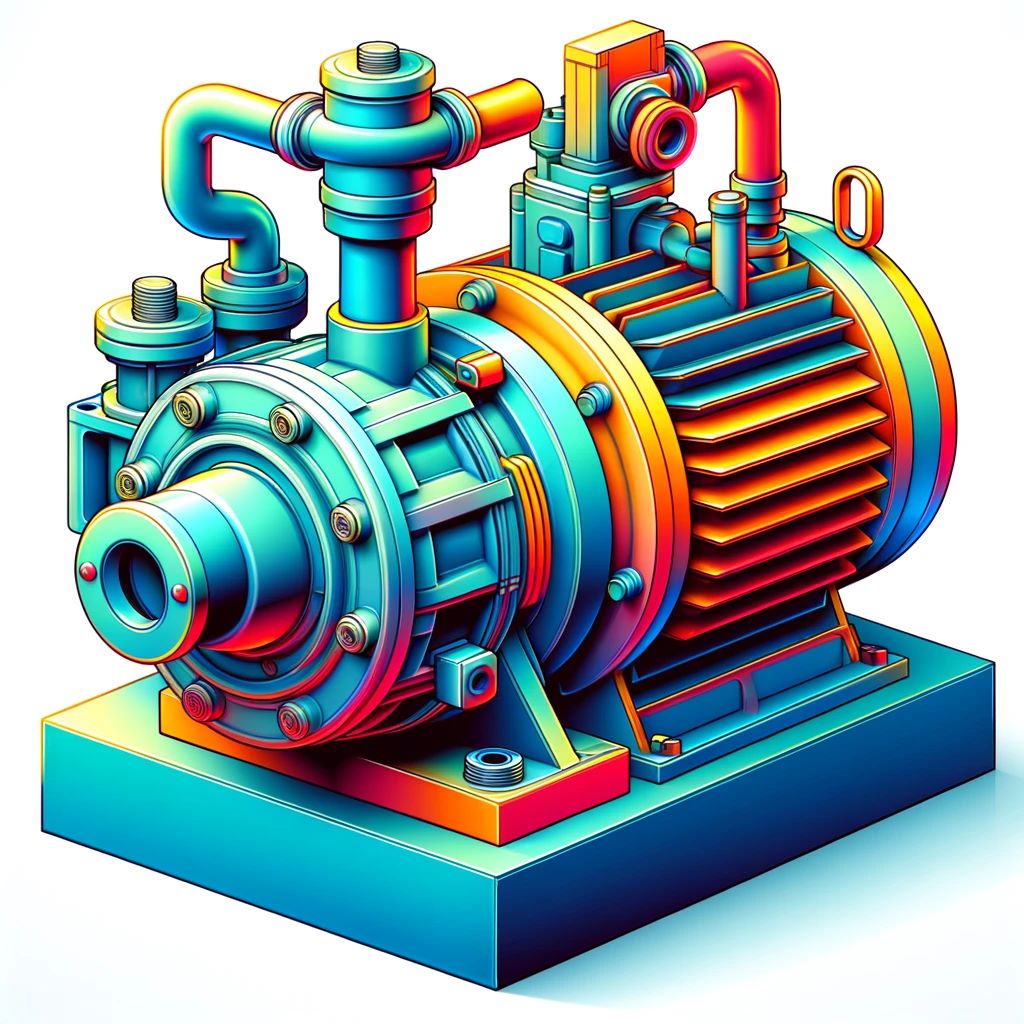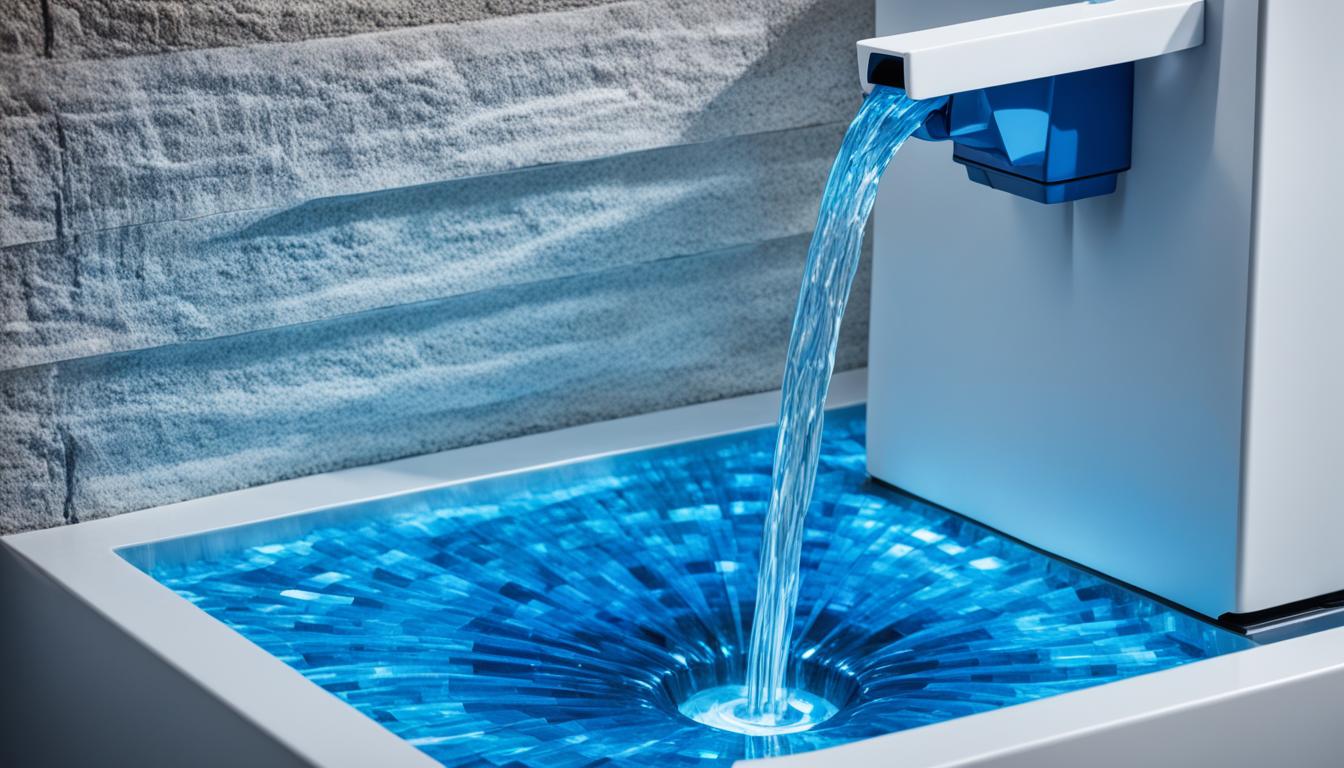This post contains affiliate links.
Did you know that approximately 15% of the U.S. population relies on private wells for their water supply?
If you are one of the millions of households that depend on well water, ensuring its quality and the proper functioning of your well pump is crucial. In this comprehensive guide, we will explore everything you need to know about water quality, well pumps, water testing, water treatment, installation, repair, maintenance, and more. By understanding the ins and outs of well pumps and implementing the right measures, you can enjoy a safe and reliable water supply for your household.
Key Takeaways:
- Approximately 15% of the U.S. population relies on private wells for their water supply.
- Water quality and proper well pump function are essential for a safe and reliable water supply.
- This guide covers everything from well pump installation to maintenance and water treatment.
- Professional well pump services can provide expert assistance for any water quality or well pump-related needs.
- Regular maintenance and testing are crucial to ensure optimal water quality and the longevity of your well pump.
Understanding Well Pumps
A well pump is an essential component of a water well system, responsible for extracting water from the ground and delivering it to your home. Understanding how well pumps work and the different types available can help you make informed decisions when it comes to your well water supply.
Well pumps are electromechanical devices that are installed after the drilling or digging of a well. Their primary function is to pump water from the well into your house, ensuring a steady supply of water for various uses.
There are three main types of well pumps:
- Centrifugal Pumps: These pumps generate water flow through centrifugal force. They use an impeller to create suction, drawing water from the well and propelling it towards your home. Centrifugal pumps are commonly used in shallow and medium-depth wells.
- Submersible Pumps: As the name suggests, submersible pumps are fully submerged in the well. They push water upwards to the surface using a series of stages or impellers. Submersible pumps are ideal for deep wells and are known for their efficiency and reliability.
- Jet Pumps: Jet pumps utilize suction and pressure to lift water from the well. They work by injecting high-velocity water into a venturi tube, creating a partial vacuum that draws water from the well. Jet pumps are commonly used in shallow and medium-depth wells.
When selecting a well pump, it’s essential to consider the depth of your well, the water demand of your household, and your specific requirements. Consulting with a professional can help you determine the most suitable well pump for your needs.
Centrifugal pumps, submersible pumps, and jet pumps are the three main types of well pumps used in residential water well systems. Each type has its own benefits and considerations, so it’s important to choose the right one based on your well specifications and water usage requirements.
Now that you have a better understanding of well pumps, let’s dive deeper into the factors that influence pump selection and the installation process in the next sections.
Choosing the Right Well Pump
When it comes to selecting the most suitable well pump for your needs, several factors should be taken into consideration. These factors include the size of your property, the amount of water your household consumes, and the depth of your well. By considering these aspects, you can ensure that you choose the right well pump for efficient and reliable water supply.
Types of Well Pumps
There are different types of well pumps available, each designed for specific well depths and requirements. Let’s take a closer look at two common types:
Shallow well pump:
A shallow well pump is suitable for wells with a depth of 25 feet or less. These pumps are commonly used for residential and small-scale irrigation purposes.
Deep well pump:
If your well is deeper than 25 feet, a deep well pump would be more appropriate. Deep well pumps are specifically designed to handle greater depths, providing a consistent water supply even in deep wells.
In addition to shallow well and deep well pumps, there are also submersible pumps and jet pumps available on the market. Submersible pumps are submerged directly into the well and can operate at various depths. They are known for their quiet operation and high efficiency. Jet pumps, on the other hand, are installed above ground and use suction to draw water from the well.
Here’s a comparison table outlining the key features of these different well pump types:
| Well Pump Type | Maximum Well Depth | Key Features |
|---|---|---|
| Shallow Well Pump | 25 feet or less | Easy installation, suitable for small-scale use |
| Deep Well Pump | Deeper than 25 feet | Designed for greater depths, consistent water supply |
| Submersible Pump | Varies depending on model | Quiet operation, high efficiency |
| Jet Pump | Varies depending on model | Above-ground installation, uses suction |
It is important to consult with a professional well pump installer or expert to determine the right pump size and type for your specific well. They can assess your well’s depth and water demand, ensuring you choose the ideal well pump that will provide efficient and reliable water supply for your property.
Installing a Well Pump
Installing a well pump is a multi-step process that involves careful planning and precise execution. To ensure a successful installation, it is recommended to hire a professional well pump installation service. Their expertise and experience will guarantee that the pump is correctly installed and properly connected to the well and plumbing system.
- Drilling or Digging the Well: The first step in the well pump installation process is drilling or digging the well. This process involves creating a hole in the ground to access the groundwater source. The depth and diameter of the well will depend on various factors, including the water table level and the specific requirements of your property.
- Connecting the Pump to the Well: Once the well is drilled or dug, the next step is to connect the well pump to the well. This involves attaching the pump to a drop pipe that extends into the well. The pump will be submerged in the water and positioned at an appropriate depth to ensure efficient water extraction.
- Installing Piping and Electrical Connections: After connecting the pump to the well, the next step is to install the necessary piping and electrical connections. This includes running pipes from the well pump to the pressure tank and plumbing system of your house. Electrical connections will also be made to supply power to the pump and control its operation.
By hiring a professional well pump installation service, you can have peace of mind knowing that the installation process will be handled by experts who are familiar with the proper techniques and industry standards. They will ensure that the well pump is installed safely, efficiently, and in compliance with local regulations.
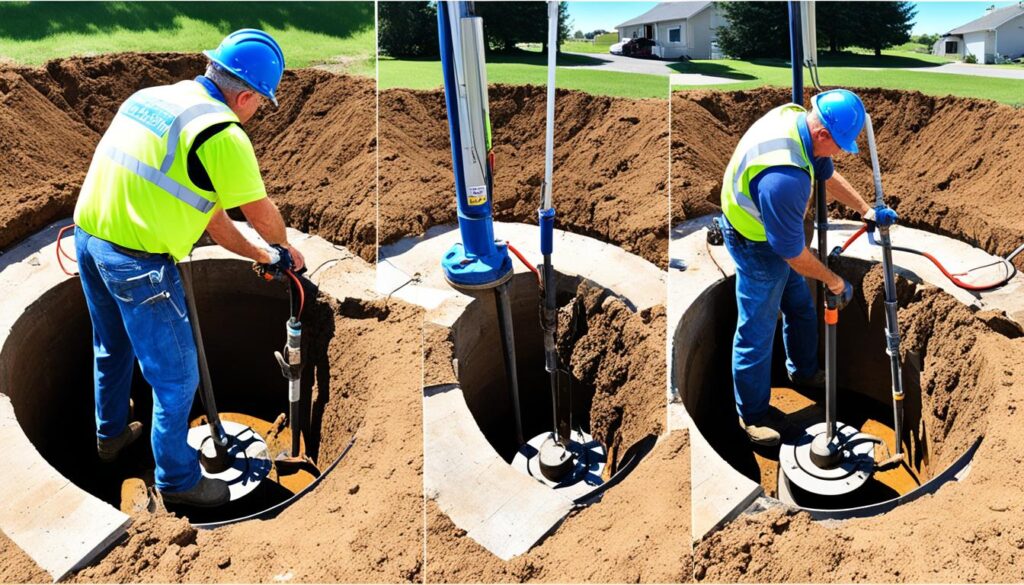
It is always recommended to hire a professional for well pump installation to ensure that the pump is correctly installed and properly connected to the well and plumbing system.
Maintaining a Well Pump
Regular maintenance is essential to ensure that your well pump operates optimally and provides a reliable water supply. By performing routine checks and following proper maintenance procedures, you can prevent potential issues and extend the lifespan of your well pump. Here are some valuable well pump maintenance tips and a checklist to help you keep your system running smoothly:
Well Pump Maintenance Tips:
- Inspect for damage or leaks: Regularly examine your well pump for any signs of damage, including cracks, corrosion, or water leaks. Any visible issues should be addressed promptly to prevent further damage.
- Test the pump’s pressure and flow rate: Measure the pressure and flow rate of your well pump regularly to ensure that it is operating within the recommended range. Low pressure or flow rate could indicate a problem that needs attention.
- Check and clean/replacement filters: Filters play a crucial role in preventing debris and pollutants from entering your well pump system. Clean or replace filters as recommended by the manufacturer to maintain optimal performance.
- Monitor electrical connections: Inspect the electrical connections of your well pump, including wiring, switches, and circuit breakers, for any loose or damaged components. Ensure that the electrical supply to the pump is stable and secure.
- Keep the area around the well pump clean: Remove any debris or vegetation that may obstruct the well pump or its ventilation openings. An unobstructed well pump has better airflow and reduces the risk of overheating.
While the above tips can help you maintain your well pump on your own, it is also advisable to enlist the services of a professional well pump maintenance technician.
Well Pump Maintenance Checklist:
| Task | Frequency |
|---|---|
| Inspect for damage or leaks | Every 3 months |
| Test the pump’s pressure and flow rate | Every 6 months |
| Check and clean/replace filters | Every 6-12 months |
| Monitor electrical connections | Every 12 months |
| Keep the area around the well pump clean | As needed |
Hiring a professional well pump maintenance service at least once a year can help identify and address any potential issues, perform more advanced maintenance procedures, and ensure the longevity of your well pump system.
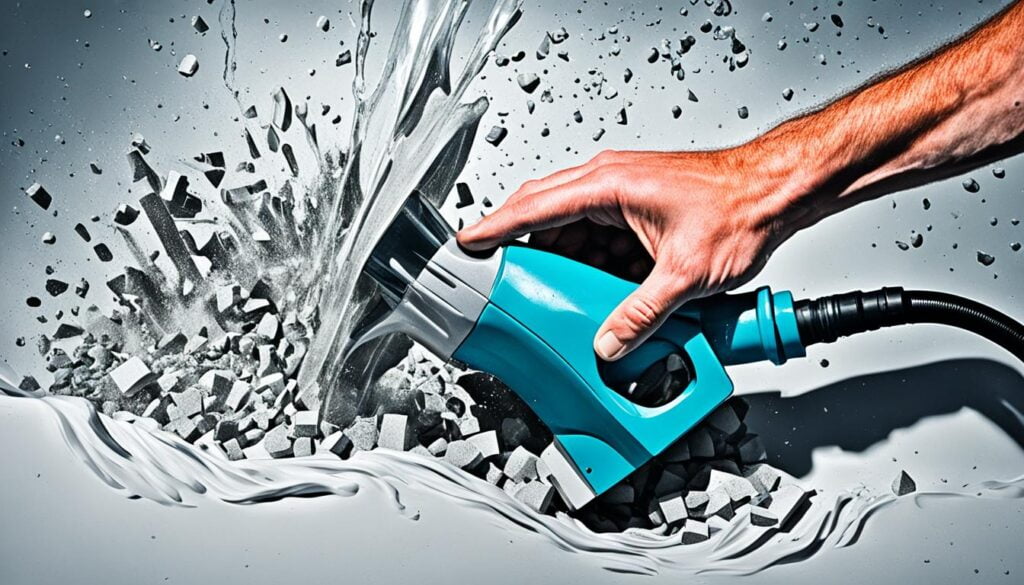
Repairing a Well Pump
Well pumps can encounter various issues that can affect their performance and functionality. Understanding and addressing these common problems requires expertise and technical knowledge. When you encounter issues with your well pump, it is recommended to seek the assistance of a professional well pump repair service.
Common problems with well pumps include:
- Loss of pressure: If you notice a decrease in water pressure, it could indicate a problem with your well pump. This can be caused by issues such as a faulty pressure switch, clogged pipes, or a malfunctioning pump.
- Motor failure: A well pump’s motor can fail due to various factors, including wear and tear, electrical problems, or overheating. Electrical issues such as a blown fuse or a tripped circuit breaker can also contribute to motor failure.
- Electrical problems: Faulty wiring, damaged electrical components, or power supply issues can disrupt the functioning of your well pump. These problems require proper diagnosis and repair to restore the pump’s electrical functionality.
When faced with these or any other well pump issues, it is essential to consult a professional well pump repair service. They have the expertise, tools, and experience to accurately diagnose the problem and provide the necessary repairs. Attempting to repair a well pump without proper knowledge and experience can lead to further damage and potential safety hazards.
“Well pump repairs require specialized knowledge and skills to accurately diagnose and fix the problem. Hiring a professional well pump repair service ensures that the repair work is done correctly, restoring your well pump’s functionality and preventing future issues.”
Advantages of Professional Well Pump Repair
Opting for professional well pump repair services offers several benefits:
- Expertise: Professional technicians have extensive knowledge of well pump systems and the underlying causes of common well pump problems. They can quickly identify the root cause of the issue and provide efficient repairs.
- Efficiency: Well pump repair professionals have the necessary tools and equipment to perform repairs accurately and efficiently. They can complete the repair work in a timely manner, minimizing downtime and ensuring the prompt restoration of your well pump.
- Safety: Well pump systems involve electricity, water, and potentially hazardous components. By hiring a professional repair service, you can protect yourself from potential electrical hazards and ensure the safety of your property.
- Long-term solutions: Professional well pump repair technicians not only address the immediate issue but also provide long-term solutions. They can identify and fix underlying problems that may be affecting your well pump’s performance, preventing future breakdowns and extending the lifespan of your pump.
When it comes to your well pump, it is important to prioritize professional repair services to maintain optimal performance and prevent further damage. Consult a well pump repair specialist to diagnose and resolve any problems with your well pump effectively.
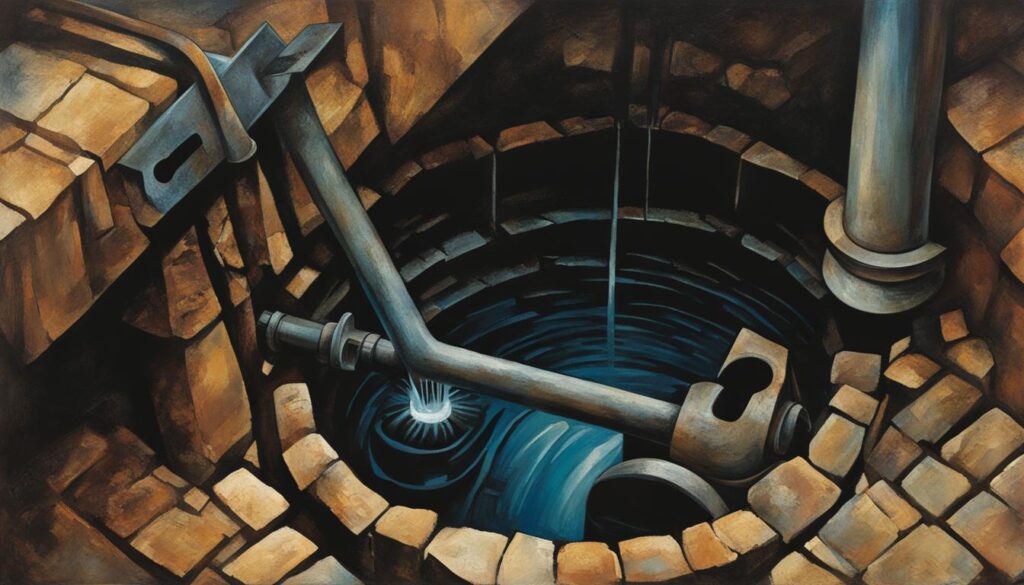
caption: Image depicting a professional technician repairing a well pump.
Water Testing and Treatment
Testing the quality of your well water is essential to ensure that it is safe for consumption. Various factors such as bacteria, chemicals, and minerals can affect water quality. If any issues are detected, appropriate water treatment measures can be taken to address specific contaminants and improve water quality.
Water Testing
Before implementing any water treatment systems, it is crucial to conduct comprehensive water testing. This will provide valuable insights into the quality of your well water, helping you identify potential contaminants and determine the appropriate treatment methods.
Water testing involves analyzing samples from your well to check for common contaminants such as bacteria, heavy metals, pesticides, and nitrates. A professional water testing service can perform these tests accurately and provide you with a detailed report on the water quality.
Water Treatment Systems
Once you have identified the contaminants in your well water, it is time to consider the most suitable water treatment systems. These systems are designed to remove or reduce specific contaminants, ensuring that your water is safe and healthy for consumption.
There are various types of water treatment systems available, including:
- Water Filtration Systems: These systems use physical barriers or chemical processes to remove impurities and particles from the water. They can eliminate sediments, chlorine, chemicals, and other common contaminants.
- Water Softeners: If your well water contains high levels of minerals such as calcium and magnesium, a water softener can help remove these minerals and prevent limescale buildup in your plumbing system.
- Water Disinfection Systems: These systems use methods like ultraviolet (UV) radiation or chlorination to kill bacteria, viruses, and other microorganisms present in the water, ensuring its safety.
- Reverse Osmosis Systems: Reverse osmosis systems use a semi-permeable membrane to remove impurities and contaminants from the water, providing you with clean and purified drinking water.
Choosing the right water treatment system depends on your specific water quality issues and requirements. It is recommended to consult with a water treatment professional who can assess your water quality test results and guide you in selecting the most appropriate system for your needs.
Implementing water treatment systems not only improves the quality of your well water but also provides peace of mind for you and your family, knowing that the water you consume is free from harmful contaminants.

Importance of Water Filtration Systems
Water filtration systems are essential for ensuring the purity and safety of well water. These systems effectively remove impurities and contaminants, providing clean and healthy drinking water for you and your family. Let’s explore the different types of water filtration systems and the benefits they offer.
Types of Water Filtration Systems
- Activated Carbon Filters: These filters use a process called adsorption to trap and remove organic contaminants, such as chlorine, pesticides, and volatile organic compounds (VOCs). They also improve taste and odor by reducing substances that contribute to unpleasant smells and flavors.
- Reverse Osmosis Systems: Reverse osmosis is a highly effective filtration method that removes a wide range of contaminants, including heavy metals, bacteria, viruses, and dissolved solids. It uses a semipermeable membrane to separate impurities from water, ensuring high-quality drinking water.
- UV Filters: UV filters utilize ultraviolet light to kill bacteria, viruses, and other microorganisms present in the water. This method is often used in combination with other filtration techniques to provide comprehensive water purification.
Each type of filtration system offers unique advantages and addresses specific water quality concerns. Consider the specific needs of your household when choosing the most suitable filtration system for your well water.
Benefits of Water Filtration Systems
The benefits of installing a water filtration system for your well water are numerous:
- Clean Drinking Water: Water filtration systems remove harmful contaminants, ensuring that you and your family have access to clean and safe drinking water.
- Improved Taste and Odor: By eliminating chlorine, bacteria, and other substances that contribute to unpleasant tastes and odors, filtration systems enhance the overall quality of your drinking water.
- Healthier Lifestyle: Drinking filtered water reduces the risk of consuming harmful substances, protecting your health and well-being.
- Protection from Contaminants: Filtration systems help remove contaminants such as heavy metals, chemicals, and microorganisms, safeguarding your water supply.
- Cost-Effective: Investing in a water filtration system can save you money in the long run by reducing the need for bottled water and potential medical expenses caused by waterborne illnesses.
By installing a water filtration system, you can enjoy the benefits of clean and healthy water directly from your well, ensuring the well-being of your household.
With a water filtration system, you can conveniently access clean and safe drinking water right from your tap. Say goodbye to bottled water and enjoy the peace of mind that comes with knowing your well water is free from harmful contaminants.
Water Purification Methods for Well Water
When it comes to ensuring the safety and purity of your well water, relying solely on filtration systems may not be enough. Water purification methods play a crucial role in eliminating harmful pathogens and contaminants, giving you peace of mind knowing that your water is safe for consumption.
One effective method of water purification for well water is chlorination. Chlorination involves the addition of chlorine to the water, which effectively kills bacteria, viruses, and other microorganisms that may be present. This method can effectively disinfect well water, making it suitable for drinking and other household uses.
Another popular method of disinfection is UV sterilization. UV sterilization utilizes ultraviolet light to kill bacteria, viruses, and other microorganisms. This process is highly effective in neutralizing harmful pathogens and is considered a safe and chemical-free method of water disinfection.
“Water purification methods such as chlorination and UV sterilization are critical in ensuring the safety and cleanliness of well water. These methods eliminate harmful bacteria and microorganisms, providing you with pure and healthy water for your family.”
To determine which water purification method is most suitable for your well water, it is recommended to consult with a professional water treatment specialist. They can assess the quality of your water and recommend the appropriate purification method based on the specific contaminants present.
It is important to note that water purification methods should be implemented in conjunction with filtration systems for optimal results. While filtration systems effectively remove impurities and sediments, purification methods ensure that any potential harmful pathogens are eliminated, making your well water safe for consumption.
Well Pump Services
When it comes to maintaining your water well and ensuring its optimal performance, professional well pump services are essential. These services encompass a wide range of expertise, including installation, repair, maintenance, and water testing. By relying on these professionals, you can rest assured that your well pump is in the hands of experts who understand the intricacies of well systems.
If you are considering a new well pump installation, professional well pump services can guide you through the process. They will assess your water needs, evaluate your property, and recommend the most suitable well pump for your specific requirements. This ensures that your well pump is properly sized and installed, maximizing its efficiency and longevity.
When it comes to repair, well pump issues can be complex and require specialized knowledge to diagnose and fix. Professional well pump services have the expertise to identify and resolve common problems such as low water pressure, motor failure, or electrical malfunctions. They use advanced tools and techniques to efficiently troubleshoot and repair your well pump, ensuring a reliable water supply for your household.
“Professional well pump services ensure that your well pump is properly installed, well-maintained, and functioning optimally.”
Regular maintenance is vital for the longevity and performance of your well pump. Well pump professionals can schedule routine maintenance visits to inspect and service your well pump, preventing potential issues from escalating and causing costly repairs. They will conduct comprehensive checks, clean filters, test pressure, and address any minor concerns before they develop into major problems.
In addition to maintaining your well pump, these experts also offer water testing services. Water quality is a crucial aspect of well pump operation, and professional testing ensures that your water is safe for consumption. By identifying any contaminants or abnormalities, well pump services can recommend appropriate water treatment solutions, such as filtration or disinfection systems, to improve the overall quality.
To summarize, professional well pump services are an integral part of maintaining a reliable and efficient water well system. Their expertise in installation, repair, maintenance, and water testing ensures that your well pump operates optimally and delivers high-quality water to your household. When it comes to your well pump, trust the professionals for peace of mind and a hassle-free water supply.
| Benefits of Professional Well Pump Services | Affordable Solutions | Time-Saving | Expertise and Knowledge |
|---|---|---|---|
| Ensure optimal well pump performance | Offer cost-effective solutions tailored to your needs | Save time by relying on professional experience | Extensive knowledge of well pump systems |
| Maximize the lifespan of your well pump | Provide preventive maintenance to avoid expensive repairs | Efficiently troubleshoot and fix well pump issues | Stay up-to-date with the latest industry trends |
| Improve water quality through testing and treatment | Offer comprehensive warranties on equipment and services | Eliminate the hassle and stress of DIY maintenance | Access to advanced tools and technologies |
Water Quality and Well Pump Maintenance Tips
Maintaining optimal water quality and the performance of your well pump is crucial for a reliable water supply. By following these maintenance tips, you can prevent issues and ensure the longevity of your well pump, as well as the quality of your water supply.
1. Test the water regularly
Regular water testing is essential to monitor the quality of your well water. It helps identify any potential contaminants or issues that may affect the safety and taste of your water. Consider using a water testing kit or hiring a professional water testing service to ensure accurate results.
2. Clean filters
Filters play a vital role in removing impurities from your well water. Over time, they can become clogged with debris and affect the overall performance of your well pump. Regularly clean or replace your filters as recommended by the manufacturer to maintain optimal water flow and quality.
3. Check for leaks or damage
Regularly inspect your well pump and plumbing system for any signs of leaks or damage. Leaks can lead to water loss and affect the efficiency of your well pump. Additionally, damaged components can compromise the quality of your water. If you notice any leaks or damage, contact a professional well pump repair service to address the issue promptly.
4. Schedule professional maintenance services
Periodically scheduling professional well pump maintenance services is crucial for identifying and addressing potential issues before they escalate. A qualified technician can conduct a comprehensive inspection, test the pump’s pressure and flow rate, and perform any necessary adjustments or repairs to ensure optimal performance.
Remember, proper maintenance is key to prevent costly repairs, extend the life of your well pump, and ensure that your well water remains safe and of high quality for you and your family to enjoy.
Conclusion
Ensuring water quality and well pump function is crucial for maintaining a safe and reliable water supply. By understanding well pumps, choosing the right pump, and properly maintaining and treating your well water, you can ensure optimal water quality and the longevity of your well pump. Professional well pump services can provide expert assistance and solutions for any water quality or well pump-related needs.
FAQ
What is a well pump?
A well pump is an electromechanical device installed after drilling or digging a well to pump water from the well into the house.
What are the different types of well pumps?
There are different types of well pumps, including centrifugal pumps, submersible pumps, and jet pumps.
How does a well pump work?
Well pumps work by creating suction or pressure to move water from the well to a storage tank or directly into the plumbing system.
How do I choose the right well pump?
The size of the well pump you need depends on factors such as the size of your property, water usage, and the depth of your well.
What is involved in installing a well pump?
Installing a well pump involves drilling or digging the well, connecting the pump to the well, and installing necessary piping and electrical connections.
Why is regular well pump maintenance important?
Regular maintenance ensures the optimal functioning of a well pump and includes routine checks, pressure and flow rate testing, and filter cleaning or replacement.
What are common well pump issues?
Common issues with well pumps include loss of pressure, motor failure, and electrical problems.
How can I test and treat my well water?
Testing the quality of your well water is essential, and appropriate water treatment measures can be taken based on the results, such as installing water filtration or purification systems.
What are the benefits of water filtration systems?
Water filtration systems remove impurities and contaminants, improving the taste, odor, and overall quality of well water.
What are the water purification methods for well water?
Water purification methods for well water include disinfection methods such as chlorination and UV sterilization to kill bacteria and other microorganisms.
What services do well pump professionals provide?
Professional well pump services offer installation, repair, maintenance, and water testing services to ensure the optimal functioning of your well pump and water quality.
How can I maintain water quality and the performance of my well pump?
Regular maintenance, testing water quality, cleaning filters, and scheduling professional services are important for long-lasting performance and optimal water quality.
Source Links
- https://www.ready-able.com/ultimate-guide-to-well-pumps/
- https://simplepump.com/post/well-pump-buyers-guide
- https://engage.awwa.org/PersonifyEbusiness/Bookstore/Water-Wells-and-Pumps-Softcover-Edition/ProductDetail/115638668
This post contains affiliate links.
